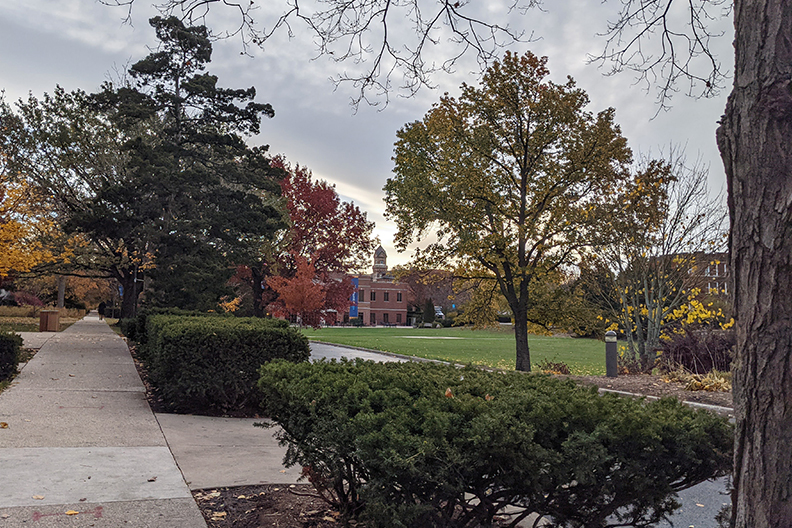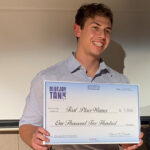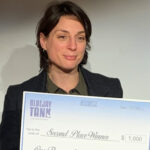 Seven Elmhurst University students recently demonstrated their entrepreneurial spirit at the Fall Term Bluejay Tank competition, pitching business concepts ranging from a mobile dating app to cleaning supply kits for college students.
Seven Elmhurst University students recently demonstrated their entrepreneurial spirit at the Fall Term Bluejay Tank competition, pitching business concepts ranging from a mobile dating app to cleaning supply kits for college students.
Loosely modeled on the popular TV show Shark Tank, the Bluejay Tank competition, hosted by the Elmhurst University E-celerator, gives students the chance to pitch their business ideas to a panel of Elmhurst University faculty and experienced entrepreneurs. In exchange, the contestants get feedback on their projects and a shot at $3,000 in cash prizes.
The competition, held earlier in the Fall Term, was the University’s third. But it was the first to be held live and in person. (The first two were held remotely because of pandemic-related restrictions).
“The energy in the room was exciting and positive,” said Martin Gahbauer, executive director of the Weigand Center for Professional Excellence. “Some of the presenters did a really great job of engaging the judges with their presentations. One brought along Italian ice to serve to the judges; another recruited other students to help with the demonstration of the business idea.”
 First place, with a cash prize of $1,500, went to Christian Vanstedum ’22, a computer science major from Deer Park, Ill., for his mobile dating app, Spark. Spark automatically connects people with similar interests who are in the same vicinity. The goal of the app is to effortlessly and easily “spark” conversations in real time between potentially compatible people.
First place, with a cash prize of $1,500, went to Christian Vanstedum ’22, a computer science major from Deer Park, Ill., for his mobile dating app, Spark. Spark automatically connects people with similar interests who are in the same vicinity. The goal of the app is to effortlessly and easily “spark” conversations in real time between potentially compatible people.
Nursing major Lauren Laughlin ’23 took second place and a $1,000 prize for Equitable Health, a health care advocacy organization and resource for the LGBTQIA+ community. Equitable Health would develop training programs for care providers about the special needs of LGBTQIA+ patients, as well as a model for what inclusive and affirming care looks like. The organization also would offer a registry of providers who had completed the training.
resource for the LGBTQIA+ community. Equitable Health would develop training programs for care providers about the special needs of LGBTQIA+ patients, as well as a model for what inclusive and affirming care looks like. The organization also would offer a registry of providers who had completed the training.
“I really entered (the Bluejay Tank competition) as a way to gauge the quality and practicality of my idea,” said Laughlin, of Oak Park. “I sincerely appreciate the efforts made to put us in touch with people that can help us further our ideas.” She plans to use her prize money to begin the research phase of her project.
 Mark Picardi ’22, of Schaumburg, took third place and a $500 prize for his idea—College Cleaners, kits of pre-packaged cleaning supplies targeted to college students. Picardi, who is majoring in logistics and supply chain management, originally intended College Cleaners to be a cleaning service, but then realized he couldn’t afford all the expenses—yet. So he decided instead to design a cleaning kit specifically for college students, and to market it to them and their parents.
Mark Picardi ’22, of Schaumburg, took third place and a $500 prize for his idea—College Cleaners, kits of pre-packaged cleaning supplies targeted to college students. Picardi, who is majoring in logistics and supply chain management, originally intended College Cleaners to be a cleaning service, but then realized he couldn’t afford all the expenses—yet. So he decided instead to design a cleaning kit specifically for college students, and to market it to them and their parents.
What he enjoyed most about participating in Bluejay Tank was giving his presentation to the judges. “I have always liked being on stage,” he said. “When I present, I can share my knowledge and show people the value of my product.”
While still in its early stages, Picardi’s project is up and running. He plans to use his prize money to develop his website and secure trademarks.
To prepare for their Bluejay Tank appearances, students met with entrepreneur-in-residence Patrick Yanahan ’94, MBA ’10 during workshops on how to develop a compelling application. He then worked with all of the applicants on their presentations, to ensure that they were best positioned for success in the Tank.
This year’s judges were Elmhurst Business and Economics Department faculty members Lawrence Brown, Eric Sanders and Bruce Fischer, who also is director of the master’s program in project management; and Erald Minga, an Elmhurst alumnus and human capital and talent management leader. Yanahan served as the facilitator.
“We were very impressed with the well-thought-out business idea presentations from the students this semester, and couldn’t be happier that they were able to safely present to the judges in-person for the full experience,” Yanahan said. “It was really a job well done by all the contestants. I know the campus and the community had to be very proud of their unique business models.”